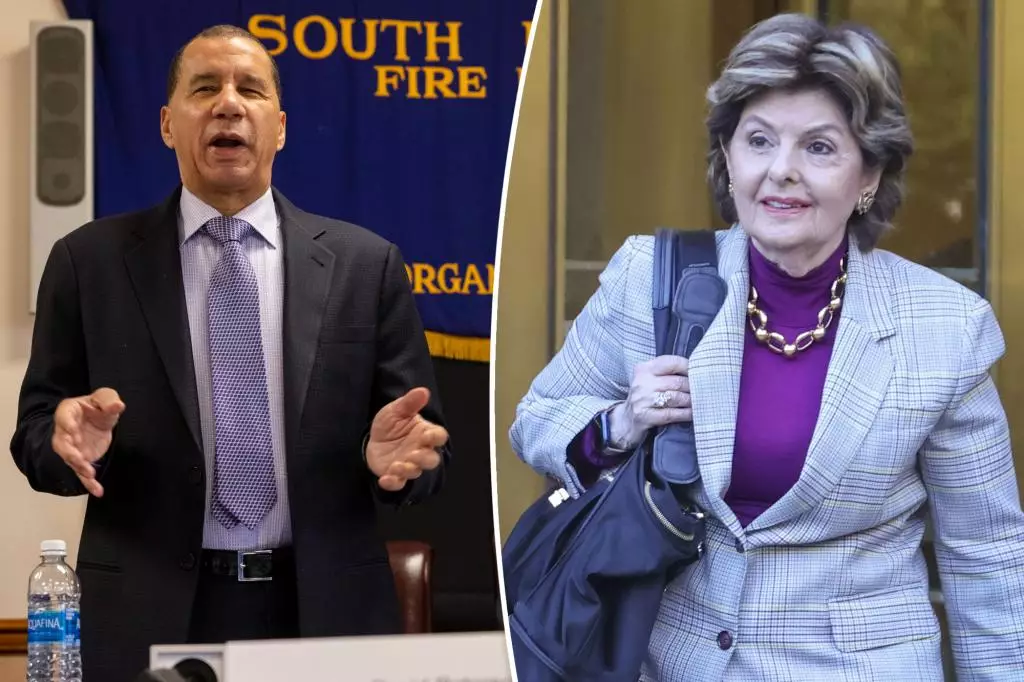In the bustling nightlife of Manhattan, former New York Governor David Paterson was recently spotted dining at the upscale restaurant Fresco by Scotto, engaging in animated discussions with renowned attorney Gloria Allred. This encounter took place merely days after Paterson and his stepson, Anthony Chester Sliwa, faced an alarming attack on the streets of the city. The juxtaposition of an illustrious evening out against the backdrop of such a traumatic event encapsulates a narrative rife with the complexities of urban life, celebrity status, and personal safety.
The 70-year-old Paterson was seen deep in conversation with the 83-year-old Allred, known for her relentless advocacy for survivors of sexual abuse. Eyewitness accounts reveal the two discussing the violent incident Paterson had recently endured. Those who witnessed the interaction noted that while the mood remained sociable, the gravity of his recent experience was palpable. Allred appeared to be lending an ear, possibly providing both moral support and strategic legal advice. Such interactions highlight how, even in moments of apparent normalcy, individuals in the public eye grapple with their realities.
The incident that spurred Paterson’s recent stress occurred on the evening of October 4, when he and Sliwa, while walking their dog, confronted a group of young individuals attempting to climb a fire escape. This encounter escalated quickly, leading to a violent confrontation. Paterson’s recounting of events—himself pushing one of the offenders against a McDonald’s window—underscores the chaotic and unpredictable nature of urban life. The altercation resulted in injuries to both Paterson and his stepson, with Sliwa suffering significant facial trauma and Paterson dealing with a head injury compounded by his already impaired vision.
This narrative brings forth the broader societal issues surrounding youth violence and public safety in urban environments. Paterson’s comments targeting those older individuals involved in the incident reflect frustration toward adults who should know better, suggesting a concerning trend where adults might incite rather than de-escalate volatile situations involving younger individuals.
As Paterson dined on classic dishes such as beet carpaccio and Dover sole while indulging in desserts like tiramisu and cheesecake, his dinner companion Allred was also enjoying herself, albeit with a somber undertone brought forth by recent news. Earlier that day, she had participated in a high-profile court hearing involving Sean “Diddy” Combs, as she represented multiple alleged victims in a high-stakes sex-trafficking case. This contrast of a celebratory evening against the dark shadows of violence and abuse paints a vivid picture of the duality of societal experiences faced by individuals, especially those in the realm of public service and advocacy.
Moreover, the attendees at Fresco by Scotto were not mere observers of the drama unfolding within their city; they were entrenched in it. Notably, Linda Yaccarino, CEO of X Corp, was also present at the restaurant, suggesting that the same space that hosted political conversations and personal struggles was also a site for corporate networking and familial celebrations.
It is crucial to acknowledge the path that led David Paterson to his current position as a target of urban crime. His tenure as New York’s governor from 2008 to 2010 was marked by challenges, underscoring his unique perspective on both governance and vulnerability. As the first African American governor of New York, Paterson often navigated complex political waters, and now, more than a decade later, he faces the stark reality of physical vulnerability in a city that once revered him as a leader.
The recent events reveal a significant emotional toll that such an attack can wield on a public figure, forcing a reconsideration of safety, accessibility, and societal trust. As we watch figures like Paterson transition from positions of power to facing public threats, an important conversation emerges regarding the responsibilities of communities to support their leaders and protect the populace from escalating violence.
David Paterson’s recent dining experience, marked by a mixture of sumptuous food and serious discourse, serves not only as a snapshot of the high-profile lives of public figures but also as a reflection of the urgent societal issues that exist beneath the surface of urban sophistication. The ex-governor’s story is a reminder that no matter one’s status, the reality of urban violence remains unsettlingly close to home.


Leave a Reply